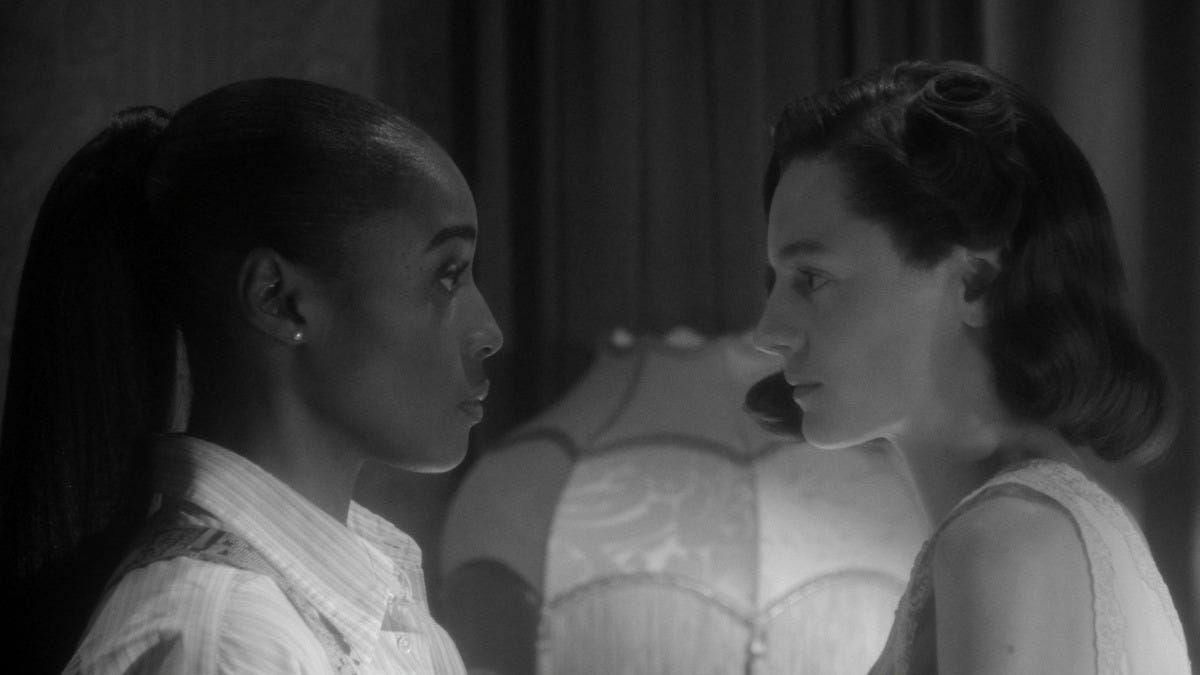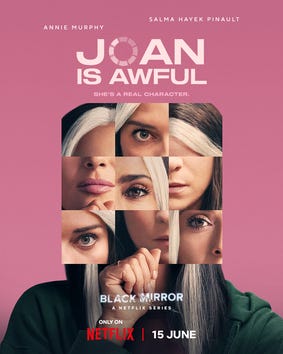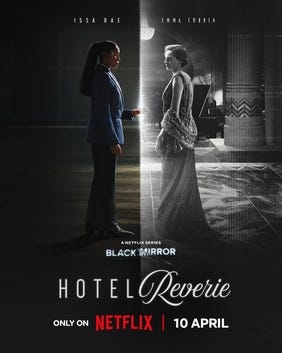036: AI-Filmmaking: Speculation vs. Reality in Black Mirror
How "Joan is Awful" (S6E1) and "Hotel Reverie" (S7E3) Blur the Line Between Creative Fiction and Technological Possibility?
In previous discussions, I explored the concept of AI-driven video-on-demand services—a speculative future where anyone could request a tailor-made movie, instantly generated through AI video tools. While we’re far from achieving this level of on-demand filmmaking, Black Mirror’s sixth season introduced two episodes—“Joan is Awful” and “Hotel Reverie”—that toyed with similar ideas, blending technological speculation with dramatic tension and satire.
Both episodes present striking visions of AI-powered content creation, but they also distort real-world filmmaking practices for the sake of storytelling. In analyzing these episodes, we can uncover where they align with plausible advancements in AI filmmaking, and where they deviate for narrative effect.
Hotel Reverie (2025), Issa Rae as Brandy Friday, Emma Corrin as Dorothy Chambers
Joan is Awful (2023), Annie Murphy as Joan Tait, Salma Hayek as TV Joan
Joan is Awful: AI-Powered Content Creation and Ethical Dilemmas
🔴 SPOILER ALERT The following section contains major spoilers for Joan is Awful. If you haven't watched it yet, I highly recommend checking it out first—then coming back to dive into the analysis!
🎬 In Joan is Awful, the premise revolves around an AI-driven streaming service (Streamberry) that generates hyper-personalized content in real time. Joan, an ordinary woman, discovers a show titled Joan is Awful—a dramatized version of her daily life, starring Salma Hayek as her exaggerated counterpart. This algorithmically-generated series unfolds exactly as Joan’s life happens, leveraging real-time data from her devices and AI-generated virtual actors to create an endless stream of content.
Where It Aligns with Reality
The idea of AI-crafted movies tailored to individual users isn’t far-fetched—deepfake technology, synthetic voice modeling, and algorithmic storytelling already exist in early forms.
The episode highlights concerns about user data privacy and content ownership, mirroring real-world discussions about how AI tools train on publicly available data without explicit consent.
Where It Takes Liberties
Quantum computing generating real-time films is far beyond today’s capabilities—while AI-assisted editing and CGI are advancing, fully autonomous film production without human input remains highly speculative.
The multiverse simulation twist (where Joan’s reality is just one layer in an infinite chain of generated worlds) transforms the episode into existential sci-fi, pushing the premise beyond technological realism.
At its core, Joan is Awful uses satire to critique AI-driven entertainment, raising concerns about privacy, engagement-driven media, and the commodification of human lives for entertainment. While the technical feasibility of its premise is exaggerated, the cultural and ethical questions it poses feel uncomfortably relevant.
Hotel Reverie: The Illusion of Real-Time Filmmaking
🔴 SPOILER ALERT The following section contains major spoilers for Hotel Reverie. If you haven't watched it yet, I highly recommend checking it out first—then coming back to dive into the analysis!
Hotel Reverie presents a different kind of AI-driven storytelling—one that speculates on the future of virtual production and digital performance capture. Unlike Joan is Awful, which critiques the streaming industry, Hotel Reverie explores immersive AI filmmaking, where actors enter a fully simulated movie world and perform in real time.
When I started watching the episode, I was immediately curious about how ReDream, the virtual filmmaking system, would be portrayed. Interestingly, the main actress, Brandy Friday, mirrored the audience’s curiosity—she too was learning how the system worked, having missed the instructions sent to her on a USB stick (which had fallen unnoticed when she opened the envelope). This detail led to some hilarious early scenes, where Brandy’s acting felt goofy, almost like someone testing the mechanics of a new immersive game.
Yet despite her awkward performance, the production team didn’t request retakes, due to its limited budget—which only allowed for a few hours of studio usage. This idea was crucial to the episode’s dramatic tension, but it diverges from real-world filmmaking practices in several key ways.
Where It Strays from Reality
While virtual production techniques (such as LED stages, motion capture, and AI-enhanced CGI) are rapidly evolving, the episode exaggerates the feasibility of real-time storytelling in a single continuous take.
Unlike traditional filmmaking, where multiple takes refine performances, Hotel Reverie demands that Brandy act the entire film in one go, which is unrealistic even for AI-driven productions.
Even one-shot films (Rope (1948), Birdman (2014), 1917 (2019)) rely on hidden edits, careful choreography, and rehearsals—the idea of creating a seamless performance without any adjustments is impractical.
The Emotional Core: Romance Within the Simulation
Beyond its technological premise, Hotel Reverie delivers one of the most emotionally compelling narratives I’ve seen recently. Clara’s realization—that she was created based on a deceased actress who tragically took her own life after rumors of her sexuality—adds immense depth and melancholy to the story.
Despite this revelation, Clara chooses to embrace her reality rather than fight it, forming a profound and touching romantic connection with Brandy. The love between a real actress inside a simulated world and an AI construct gaining sentience becomes the emotional backbone of the episode, making their inevitable farewell deeply heartbreaking.
The Tragic Goodbye
When the connection to the real world is restored, the studio resets the simulation to three months earlier for Brandy and Clara—but only ten minutes in real time. Learning that Clara will no longer remember their love devastates Brandy, making it almost impossible for her to resume her performance.
Yet, in a quiet yet powerful twist, Clara still seems to remember. She sacrifices herself in the final scene, ensuring the movie reaches its end credits, allowing Brandy to return to her real body. This final act transforms Clara’s AI existence into something deeply human, leaving an emotional imprint far beyond the episode’s technological themes. —For a detailed explanation about the ending of the episode please read the article on Tudum (as in Netflix’s intro “tu-dum!”). —
The Future of AI Filmmaking: What Will Actually Happen?
While Black Mirror presents compelling speculative fiction, neither episode offers a realistic roadmap for AI-driven filmmaking. Instead, they use narrative exaggeration to heighten tension, spark ethical debate, and create emotional resonance.
Here’s what’s more likely for real-world AI filmmaking:
AI-Assisted Production Will Enhance Filmmaking, Not Replace It
AI tools will refine pre- and post-production, helping with automated editing, visual effects, and digital performances—but human creativity will remain central.
Filmmaking Will Still Require Iteration and Refinement
Unlike Hotel Reverie, AI filmmaking will still allow retakes and scene revisions—experimentation is vital to storytelling.
Ethical Challenges Will Shape AI’s Role in Entertainment
Joan is Awful highlights concerns about privacy, data mining, and digital likeness rights—these will likely dominate AI policy discussions in entertainment.
Ultimately, AI filmmaking will augment creativity rather than overwrite it, ensuring that storytelling remains a collaborative, iterative, and deeply human-driven process.
Thanks for reading this far. Feel free to share your thoughts—and take care!





